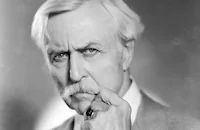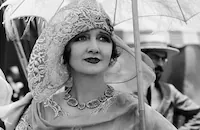Shipmates
Brief Synopsis
Cast & Crew
Harry Pollard
Robert Montgomery
Ernest Torrence
Dorothy Jordan
Hobart Bosworth
Cliff Edwards
Film Details
Technical Specs

Synopsis
When John Paul "Jonesy" Jones, a wise-cracking sprightly oiler on a Navy barge, is granted shore leave, he goes to the home of his sweetheart Letitia, only to find that she has married the brutish Scotty McTavish in his absence. Upset, Jonesy and his friend What-Ho declare themselves woman haters and drive to What-Ho's posh home, where they attend a fancy party thrown by What-Ho's uncle, Captain Beatty. While mingling with the guests, Jonesy is introduced as a South American oil man, which leads to rumors that Jonesy is a Brazilian oil tycoon. The lovelorn Jonesy soon forgets his woes when he meets Kit Corbin, the beautiful daughter of Admiral Ben Corbin. Following What-Ho's success in separating Kit from her unwanted beau, Lieutenant Mike Watson, What-Ho drives his newly found love, Mary Lou, Kit and Jonesy, to the seashore for an evening of romance. Before returning to his post, Jonesy tells Kit that, because of his "business," he will only be able to see her on the weekends. As soon as Jonesy returns to the barge, however, he is transferred to the fleet's flagship, which is under the command of Admiral Corbin. Upon his discovery that Jonesy misrepresented himself to him and his daughter, the soon-to-be retired Corbin forbids Kit to see him. Jonesy's troubles are then compounded by the fact that he has been put under McTavish's supervision. Also on board the flagship is Mike, who threatens to punch Jonesy if he sees him with Kit again. After months of preparation, the battle fleet moves into the firing grounds, and Jonesy, unaccustomed to hard labor, is put to work loading the ship's guns. Although Jonesy and Scotty receive a reprimand from the Admiral for scrapping during the maneuver, the mission ends successfully and Jonesy is decorated for his work. Back in port, Mike falls overboard when Jonesy pushes the boat out from under him, but Jonesy claims that it was an accident. Scotty, who has developed a respect for Jonesy following his show of "guts" during the exercise, becomes a witness on Jonesy's behalf in the mishap and saves him from punishment. Jonesy soon realizes that he likes the idea of giving orders and, with Scotty's help, studies hard to prepare for his advancement. Following her father's retirement from the Navy, Kit resumes her romance with Jonesy. When Mike learns that Jonesy is dating Kit once again, however, and that Jonesy has been transferred to Annapolis, he goes after him. A fight ensues and Jonesy easily defeats Mike. While walking along the waterfront, Jonesy runs into Corbin, who has been depressed about his forced retirement. An explosion aboard the oil barge interrupts their conversation, and the two men take immediate action to stop the flames from spreading to a nearby ammunition barge. Corbin dies and Jonesy is badly injured in the rescue. Following his recuperation, Jonesy informs Kit that he will be sent away to school for four years, and she promises to remain faithfull to him during his absence.

Director
Harry Pollard
Cast

Robert Montgomery

Ernest Torrence

Dorothy Jordan

Hobart Bosworth

Cliff Edwards

Gavin Gordon

Joan Marsh

Edward Nugent

E. Allyn Warren

George Irving

Hedda Hopper
William Worthington
Crew
Malcolm Stuart Boylan
Delmer Daves
Delmer Daves
Clyde De Vinna
Lou Edelman
Cedric Gibbons
Red Golden
René Hubert
William Le Vanway
Harry Pollard
Raymond L. Schrock
Douglas Shearer
Frank Wead

Film Details
Technical Specs

Articles
Shipmates
In Shipmates, Montgomery plays John Paul 'Jonesy' Jones, a sailor who masquerades as an oil man to impress the ladies. But the gig is up when Jonesy falls for his Admiral's daughter. Adding to Jonesy's woes are two shipmates out to get him - there's the chief petty officer who uses him as a whipping boy and a rather irritated former boyfriend of the girl he loves. After some heroics, Jonesy, of course, proves himself worthy in the end - joining the Naval Academy and winning the girl. Shipmates was based on the short story Maskee by Ernest Paynter, first published in American Magazine in 1926. The Navy man was a role Montgomery would later play in real life - he would serve as a lieutenant in the U.S. Naval Reserve during WWII.
Joining Montgomery in Shipmates is character actor Hobart Bosworth as Admiral Corbin. Bosworth is often referred to as the "Dean of Hollywood" for his pioneering of the California film industry. Bosworth rose to fame on the Broadway stage in the early 1900s. His most notable roles were leads in Marta of the Lowlands and in Ibsen's Hedda Gabler. But Bosworth's stage career was cut short when tuberculosis struck. He was forced to leave New York for a warmer climate. He settled in San Diego and in 1908, was signed by the Selig Polyscope Co. to make films. Bosworth is generally credited with starring in the first movie shot on the West Coast - In the Sultan's Power (1909). And he would be influential in moving the Selig company to Los Angeles. Bosworth would write, direct, produce and star in countless films for Selig before forming his own company in 1913.
Bosworth's roles were often limited to small parts in A-pictures or character roles in B-films and serials. But he was, despite a damaged voice from the TB, able to make the transition to sound pictures. And he credited the work with restoring his heath. As Bosworth put it, "I believe, after all, that it is the motion pictures that have saved my life." It is estimated that Bosworth acted in more than 250 films between 1908 and 1942.
Another familiar face in Shipmates is Dorothy Jordan as Montgomery's love interest. Jordan had appeared opposite Hollywood heavyweights Mary Pickford and Douglas Fairbanks in The Taming of the Shrew (1929), not to mention Marie Dressler and Wallace Beery in Min and Bill (1930). She married producer Merian C. Cooper in 1933, the same year his hit King Kong was released. Jordan virtually retired from movies after her marriage. She had been slated to appear in Flying Down to Rio (1933) - instead the film featured Ginger Rogers in her first pairing with Fred Astaire. Jordan did make a brief return to Hollywood in the 1950s in three John Ford films: The Sun Shines Bright (1953), The Searchers (1956) and The Wings of Eagles (1957).
Also be on the lookout for future gossip maven Hedda Hopper - she plays the role of Auntie in Shipmates.
Producer: Harry Pollard
Director: Harry Pollard
Screenplay: Ernest Paynter, Louis Edelman, Delmer Daves
Cinematography: Clyde De Vinna
Film Editing: William LeVanway
Art Direction: Cedric Gibbons
Music: General Daniel Butterfield, Charles A. Zimmerman
Cast: Robert Montgomery (John Paul Jones), Ernest Torrence (Chief McTavish), Dorothy Jordan (Kit Corbin), Hobart Bosworth (Adm. Ben Corbin), Cliff Edwards (Bilge Bryan), Gavin Gordon (Lt. Mike Watson).
BW-72m.
by Stephanie Thames

Shipmates
Quotes
Trivia
Notes
As noted in the Motion Picture Herald review, this film marked Robert Montgomery's first starring vehicle for M-G-M. In the onscreen credits, writer Frank Wead is credited as "Lieutenant Commander Wead".














